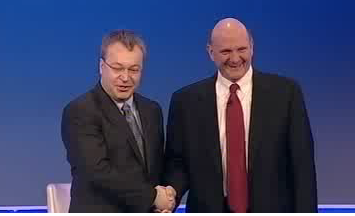Nokia to rely on Microsoft's Windows Phone 7: 'This is now a three horse race'

Nokia outlined its highly anticipated strategic overhaul, including a decision to use Microsoft's Windows Phone 7 as its primary platform. The importance of this deal can't be understated for Microsoft. Nokia's distribution will make Windows Phone 7 a top 3 platform.

Adrian Kingsley-Hughes, Sam Diaz Zack Whittaker have the initial coverage live and ZDNet UK's David Meyer is on scene at Nokia's analyst powwow. The big question: Can two hobbled mobile companies can come together to become major players? Adrian sums up the question everyone will have on Friday.
Why no Android? Why not do what HTC has done (successfully) and spread its bets?
More: Nokia statement, Microsoft statement and open letter
- Microsoft and Nokia announce my dream partnership so why aren't you all happy?
- CEOs: Nokia, Microsoft join forces to disrupt mobile ecosystems
- Nokia and Microsoft announce Windows Phone partnership
- Nokia and Microsoft team up: Suffering together, merging to survive?
- Google vs. Microsoft: The ongoing battle moves to Nokia's "burning platform"
- More Nokia coverage
"The game has changed from a war of devices to a war of ecosystems," said Nokia CEO Stephen Elop at his press conference. "We have an opportunity to disrupt the trajectory in the mobile ecosystem. Together we will deliver great mobile products."
Ballmer said Microsoft and Nokia "can work together in a different kind of a way." Nokia and Microsoft engineers will collaborate. Nokia will bring its hardware expertise to the partnership and help develop Windows Phone 7. Both Ballmer and Elop noted that the partnership will yield some enterprise friendly developments.
"We believe this partnership is also good for Microsoft."
Gee, ya think Stephen? The mobile standings via Gartner tell the tale:
Let's assume that over the next three years Nokia's Symbian operating system largely gets replaced by Windows Phone 7. If that's the case, Microsoft garners about 30 percent market share. I'm going to assume some market share leakage. At the very least, Microsoft winds up with 20 percent market share. Add it up and Microsoft just ensured there's a four-horse mobile OS race short term: Android, Apple's iOS, RIM and Windows Phone 7. If you assume RIM winds up with Android somehow, then it's a three-horse race. Elop said "this is now a three horse race."
If Android won over Nokia it would have been game, set, match for the mobile platform race. Google would have won.
Nokia shipped more than 461 mobile units in 2010. No one even comes close to that many devices. Microsoft will ride along with most of those devices.
In a nutshell, Nokia will:
- Focus on Windows Phone and Microsoft's ecosystem---Bings, Xbox Live and Office.
- MeeGo will ship, but largely be a learning experience for Nokia.
- Install a new leadership team.
- Structure the company to focus on smart devices and mobile phones---a move that makes a lot of sense.
Elop said Nokia and Microsoft have been on a journey on the mobile front. A few specifics are yet to be determined, but Ballmer and Elop have promised to disrupt, overcome challenges and be speedy.
Ballmer has taken a lot of heat for missing the mobile curve. Today, Microsoft got itself back in the game with this Nokia partnership.